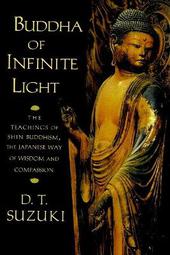
|
Buddha of Infinite Light: The Teachings of Shin Buddhism, the Japanese Way of Wisdom and Compassion
Paperback / softback
Main Details
| Title |
Buddha of Infinite Light: The Teachings of Shin Buddhism, the Japanese Way of Wisdom and Compassion
|
| Authors and Contributors |
By (author) D. T. Suzuki
|
|
Contributions by Taitetsu Unno
|
| Physical Properties |
| Format:Paperback / softback | | Pages:96 | | Dimensions(mm): Height 229,Width 152 |
|
| Category/Genre | Buddhism |
|---|
| ISBN/Barcode |
9781570624568
|
| Classifications | Dewey:294.3 |
|---|
| Audience | |
|---|
|
Publishing Details |
| Publisher |
Shambhala Publications Inc
|
| Imprint |
Shambhala Publications Inc
|
| Publication Date |
12 February 2002 |
| Publication Country |
United States
|
Description
This is an illuminating and accessible exploration of the Japanese Pure Land (Shin) tradition by one of the best-known scholars of Buddhism. Based on several lectures by D. T. Suzuki, BUDDHA OF INFINITE LIGHT explores the deep meaning of the Shin teachings and the rich imagery associated with them, providing an authoritative and affectionate introduction to this little-understood tradition.
Author Biography
Daisetsu Teitaro Suzuki (1870-1966) was one of the primary modern interpreters of Zen for the West. He is the author of many books, among them Manual of Zen Buddhism, Essays in Zen Buddhism, and Zen in Japanese Culture.
ReviewsThis volume is a revised edition of a work first published in 1970 based on D.T. Suzuki's lectures at the American Buddhist Academy in the 1950s. Although Pure Land Buddhism originated in India, it flowered during the 13 th century in Japan under the teachings of Shinran (1172-1263). Devotees of this spiritual practice were drawn primarily from the peasant class. According to D.T. Suzuki, Amida Buddha is infinite light and eternal life. A simple repetition of his name with singleness of heart is to step into the Pure Land a transcendent realm. This devotional path emphasizes faith in "other power." Salvation is all Amida's work: there is nothing one can do. In fact, pride (self-power) has no place in the Pure Land where everything is dependent on grace. As Taitetsu Unno points out in the introduction, Shin Buddhism agrees with Christianity on this point. The simple adoration involved in the vow "I take refuge in Amida Buddha" colors the everyday activities of Pure Land believers. Suzuki characterizes their lives as animated by humility, kindness, and joy. The way of devotion results in "excellence of person." And this state, in turn, emits "the wonderful of spirituality." Frederic A. Brussat, Values and Visions , April 1998
|